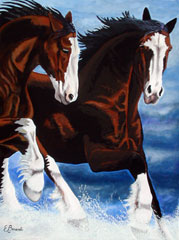| How much is a Shire?
It depends on the exemplar. Generally the draft-horse
eats, in proportion, less than a normal horse. Shire has a slower
metabolism and a calmer nature than many others breed of horses.
The draft-horse seems to be in better conditions with a diet less
sophisticated with a feeding “not too much warm”. A
good quality of hay can represent a complete base of feeding for
our horses. The diet can be integrated with some grain or pellettato.
Important for the horses during the growth is the integration of
vitamins and minerals.
Does the Shire need particular cures?
Not for sure! They are only bigger horses. They
are more sensitive to the high temperature that to the rigid temperatures
(from here the term “of cold blood”). They need shade
in the summer time, but they adjust easily to a new surrounding
like the greater part of the horses. To hold the draft-horses in
intensive stables (without a real movement or job) is limiting their
characteristics also because the movement helps their digestive
phase, rather long.
 Can
you ride a Shire? Can
you ride a Shire?
Yes. Some Shire can become optimal saddle-horses
better than many “normal” horses. Their calm nature
and sure pace make them perfect for trekking.
Many Shire are particularly gifted for dressage, with light pace
and great agility. You must only find the exemplar that better fits
you. It is also possible to do steeple-chase, but it is necessary
a lot of attention, keeping in mind that the bones and the articulations
have to support a weight of approximately a ton.
What do we have to look in a healthy Shire?
A good conformation of a draft-horse must have
a correct angle-shot on posterior legs, not to be confused with
cow hocked. When the posterior joints are not aligned and are angled,
it happens what we call cow hocks legs. A horse that answers to
the Breed standards of morphology must have perfectly straight legs (as
in all the others breed). Another important thing to verify is that
the skeleton is well built in order to support the high weight.
A horse that has an enormous body on thin legs will be destined
to have problems in its life.
What is not important in judging a Shire?
Size, colour, and dappling, that for a long
time have obsessed the breeders of the Shire, must be left behind
morphologic criteria adapted to the features of the horse in order
to be able to return to have “great horses” and not
only perfect horses for “colour and dappling”. |
